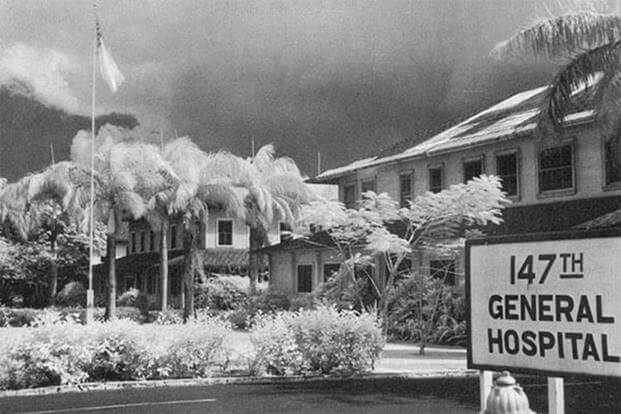Excerpted from interviews taken for the National Geographic program, Pearl Harbor: Legacy of Attack, on the National Geographic Channel.
Second Lieutenant Madelyn Blonskey, of the Army Nurse Corps, was in her room at the nurses’ quarters near Tripler Army Hospital, about 6 miles from Battleship Row when the attack began.
About 8:20 a.m., the on-call nurse in the operating room at Tripler called me, very upset and anxious. She said a soldier had told her Pearl Harbor was being attacked. I suggested that she go to the end of the operating room and look out. There was a good view of Pearl Harbor from there. She returned shortly and said, “Madelyn, something is strange. The sky is full of black smoke. There is an awful smell in the air, like burning oil, and a lot of noise.” I decided to go to the hospital, which was about a ten – or fifteen-minute walk away.
As I stepped out of the nurses’ quarters, I had an awful feeling. Usually, the smell of gardenias and hibiscus from the garden was delightful. But I smelled the odor of sulfur and burning oil. I heard some buzzing above me. There were about twenty very small planes, flying low, almost touching the treetops.
I hurried toward the side entrance of the hospital and started up the stairs to a second-floor porch. As I reached the top of the stairs – I will never forget what I saw- there were about fifteen or twenty stretchers with injured men lying on them. They were lined up head-to-toe next to the railing of the porch. There were more bloody wounds – caused by shrapnel – than I had ever seen in my life.
Nurses gave the wounded morphine, a drug that eased pain. To show that a man had been given morphine, a nurse put M on his forehead.
We started operating. The air-raid sirens blew. And we heard the roar of planes over the fragile wooden hospital. We had nowhere to go. We had a patient in the middle of an operation. The big bombers, heading for Pearl Harbor, flew so low that the vibrations shook the instruments on the table. The chief of surgery said, “Madelyn, if we are hit, I want to say to you that it is a pleasure to have worked with you; you are a good anesthetist.” I was scared. I said, “Colonel, I know God knows we did nothing to deserve this, I am putting my trust in him.”
Caring for the wounded and dying went on for days. Schools were made into temporary emergency rooms. The cafeteria was used for the operating room and the kitchen was used for sterilizing instruments. There were shortages of bandages and medicines. We were not prepared for the many hundreds of casualties. But we did the best we could with what we had to work with. There was no shortage of blood. Civilians, soldiers, sailors, and Marines appeared day and night to give blood.















